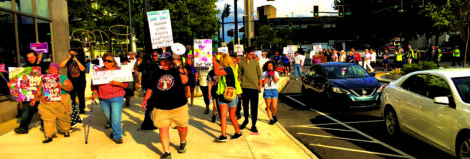Black residents ask judges to ‘alter’ decision on disenfranchisement in 6th District
Three black Youngstown residents who lost a federal lawsuit seeking to invalidate Ohio’s congressional map contending it disenfranchises black voters, particularly in the Mahoning Valley, have asked the judicial panel that ruled against them to “alter or amend” the decision.
The July 1 decision by a three-member judicial panel “contains a clear error of law concerning” the interpretation of Section 2 of the Voting Rights Act of 1965 according to the filing by Percy Squire, the plaintiffs’ attorney.
The court rejected the argument that the map violated the act, stating precedent requires a proposed district to have a black majority to nominate a candidate.
“That is fatal to their claim,” the 3-0 judicial panel’s decision states.
The plaintiffs said the case is about nominating, rather than electing, a candidate of choice, according to the judges.
“The relabeling does not help,” the decision states.
The opinion, Squire wrote, “violates well-settled rules of statutory construction which requires courts to give effect to all words in a statute. More importantly, the court’s baseless statement that the term ‘nomination’ has no VRA significance not only violates a cardinal principle of statutory construction that courts must give effect, if possible, to every clause and word of a statute and courts are obligated to give effect, if possible, to every word Congress used.”
Squire added, “The court’s groundless disregard for Congress’ specific inclusion of the term ‘nomination’ within Section 2 has the unfortunate potential to be relied in other VRA actions as a correct statement of law when this honorable court has cited no authority from any court, including the United States Supreme Court, for the statement that ‘nomination’ has no (Section) 2 significance.”
In his conclusion, Squire wrote, “It is respectfully requested the July 1 order be vacated to the extent it ignores settled rules of statutory construction and portends further erosion of the protection provided by the VRA because it states the inability (by a black majority) to nominate a candidate alone is not of (Section) 2 significance, despite the absence of any judicial authority for that proposition and express language in the VRA to the contrary.”
The judicial panel on July 1 rejected requests for a temporary restraining order, preliminary injunction and partial summary judgment to stop the certification of the June 11 special election in the 6th Congressional District that resulted in Republican Michael Rulli winning and representing the district. Those results were certified June 27.
The plaintiffs are the Rev. Kenneth Simon, senior pastor of New Bethel Baptist Church; the Rev. Lewis W. Macklin II, lead pastor of Holy Trinity Missionary Baptist Church; and Helen Youngblood, a former labor leader who is chairwoman of the Mahoning Valley 1619 Project.
The court rejected the plaintiffs’ argument that the state’s congressional map violates the act and the U.S. Constitution’s 1st, 14th and 15th Amendments.
The Youngstown residents contend the boundaries of the 6th District needed to be redrawn because the state’s congressional map approved by the Ohio Redistricting Commission in 2022 disenfranchised black voters in the Mahoning Valley by splitting Youngstown and Warren — where a majority of the area’s black voters reside — and put both in predominantly white districts.
If the 6th District’s boundaries were changed, most or all of the state’s 14 other congressional districts would have to be adjusted.
In addition to the Ohio Redistricting Commission, other defendants in the case are Gov. Mike DeWine, Secretary of State Frank LaRose, Auditor Keith Faber, Senate President Matt Huffman and House Speaker Jason Stephens. The first four were members of the redistricting commission who voted to approve the unconstitutional maps along with Bob Cupp, who was House speaker at the time.
The defendants filed a May 17 motion to dismiss the case and oppose the requests for a temporary restraining order, preliminary injunction and partial summary judgment.
Julie M. Pfeiffer, an assistant Ohio attorney general representing the state Republican officials in this case, wrote, “As a matter of law, no private right of action exists for claims” under Section 2 of the VRA.
She added if there was any change to the June 11 special election in the 6th District, it would “be manifestly unfair to Ohio voters and candidates and would destroy public confidence in the integrity of Ohio elections.”
New congressional lines are to be drawn for the 2026 election. Also, there is a constitutional amendment that could appear on this year’s general election ballot that could change how the lines are drawn, putting that in control of a citizens’ committee.
The U.S. Court of Appeals for the 6th District ruled April 9 that U.S. District Court Judge John R. Adams erred in 2022 when he dismissed the case from the three Youngstown residents contending the Voting Rights Act and the U.S. Constitution weren’t violated. The appeals court ordered a three-judge panel to hear the matter.
Hearing and dismissing the case were Adams, U.S. District Court Judge Solomon Oliver and Judge Joan L. Larsen of the 6th District Court of Appeals.
The lawsuit contended that putting Youngstown voters “into a racially polarized voting block of voters located in several racially polarized counties south of Mahoning County and stretching over 165 miles” violates the act and the U.S. Constitution.
All of Trumbull County, where Warren is located, was put into the 14th Congressional District, which is also overwhelmingly white.
Large portions of Mahoning and Trumbull — and sometimes the entirety of the two — were in the same congressional district for decades.
Have an interesting story? Contact David Skolnick by email at dskolnick@vindy.com. Follow him on X, formerly Twitter, @dskolnick.




